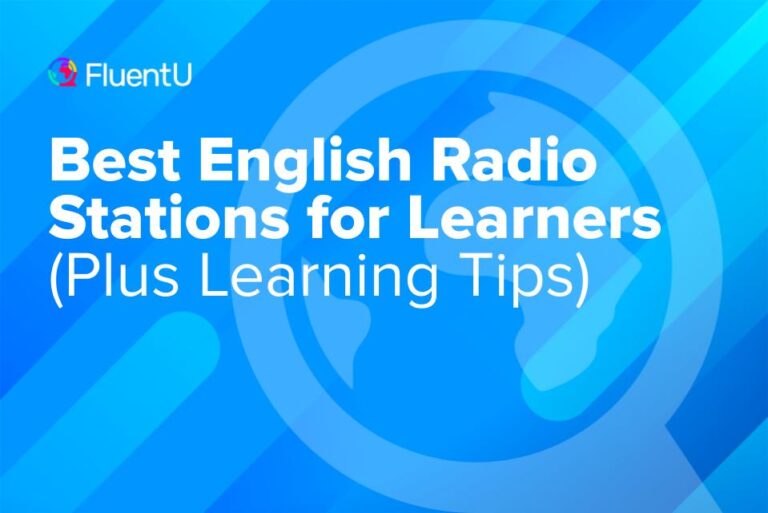80 Ways to Say Goodbye in English
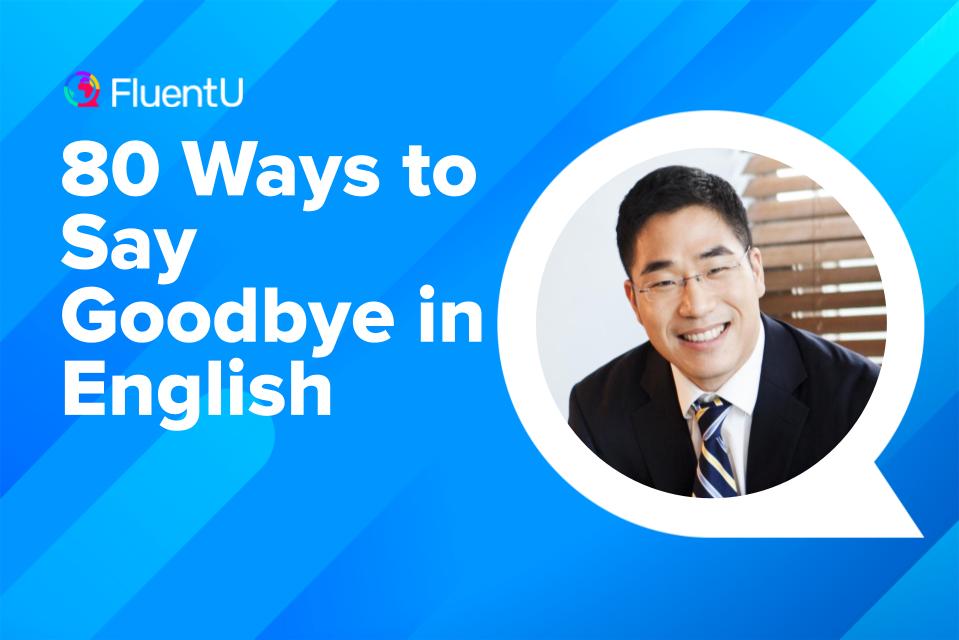
There are many ways to say goodbye in English.
Some are appropriate for work and professional settings, while others are reserved for casual interactions with friends and family.
In this post, you’ll learn 80 different phrases and expressions to say goodbye in all different kinds of scenarios.
Bookmark or print this page so you can keep practicing them and feel confident closing a conversation in English.
Download: This blog post is available as a convenient and portable PDF that you can take anywhere. Click here to get a copy. (Download)
Common Ways to Say Goodbye in English

Goodbye
As strange as it seems, the word “goodbye” is rarely used to say goodbye. It sounds very formal and is typically only used if you’re never going to see the person again.
However, we use it to refer to the action of saying goodbye.
We’re leaving in a few minutes. Say goodbye to your friends.
Bye
This is the standard goodbye. It’s short, simple, and you can say it to absolutely anyone. It’s appropriate for friends, family, co-workers and business partners.
Even if you use some of the other expressions on this list, you normally still say “bye” as well afterward.
It was great seeing you. I hope we can meet up again soon. Bye!
Bye-bye
This sweet and babyish expression is usually only used when speaking to children.
Occasionally, adults will say “bye-bye” to each other, but only if they know each other well and are trying to be flirtatious or cute. You don’t want to say this to a colleague or business partner.
Bye-bye, Joey! Have a great day at school!
Ways to Say Goodbye in Formal Settings
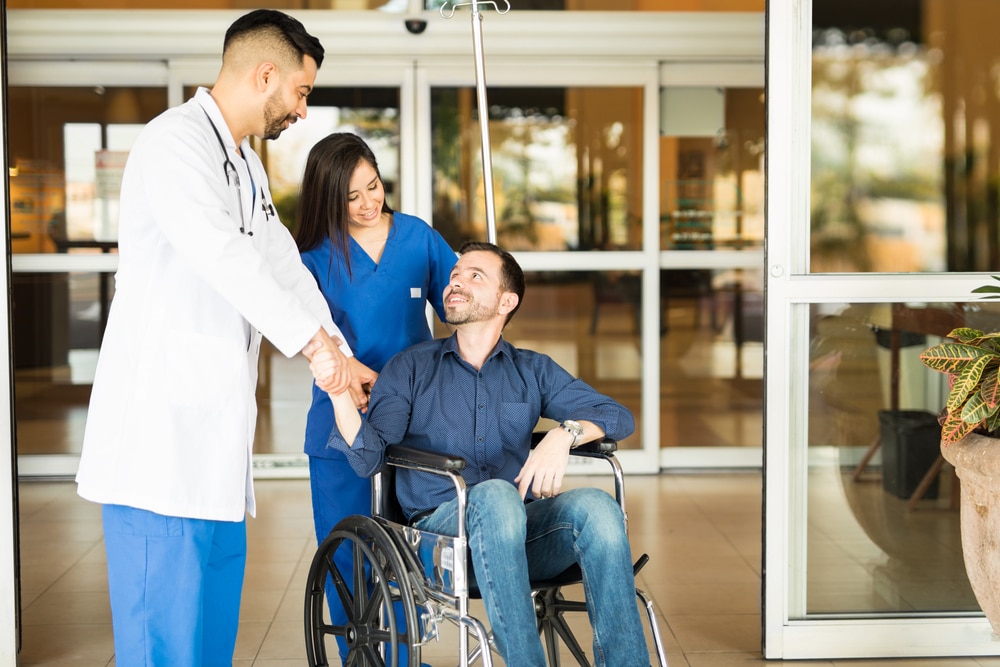
Here are some ways to say goodbye in more formal settings or when doing business with someone, as well as some slightly more casual alternatives you can use with your coworkers when leaving for the day.
Note that in these phrases, the adjectives “nice,” “good” and “great” are interchangeable. For example, you can say “Have a nice day,” “Have a good day” or “Have a great day” and they all mean pretty much the same thing.
| English | Context | Example |
|---|---|---|
| Have a nice day/Have a great rest of your day | This is a common way for cashiers, shop attendants or restaurant staff to say goodbye to customers during the day. | Thanks for shopping with us. Have a nice day! |
| Have a nice evening | You can use this phrase to say goodbye to someone in the evening or late afternoon, like when you're leaving work for the day. | I'm heading home. Have a nice evening! |
| Have a great (rest of your) week | If you won't see someone for the rest of the week, you can say this. | It was nice meeting with you. Have a great week and I'll see you next Tuesday. |
| Have a great weekend | You can say this on a Friday to coworkers or anyone you generally see only during the week. | Have a great weekend! See you on Monday. |
| I look forward to our next meeting | This formal expression is appropriate if you want to continue working with someone. | Thank you for your time today. I look forward to our next meeting. |
| Until... | This expression is a little less common, but you might use it if you know the next time you’ll see the person. | It was nice seeing you. Until next week! |
| Take care | This is a warm expression that can be used in professional situations as well as more casual ones. | I'll see you when I get back from vacation. Take care! |
| It was nice meeting you | If this was the first time you met the person, you can use this phrase when saying goodbye. | It was nice meeting you. I hope to continue working together in the future. |
| It was nice to see you again / It was nice seeing you | You can use this expression to say goodbye to someone you already know or have met before. | Bye, it was nice seeing you! |
Casual Ways to Say Goodbye
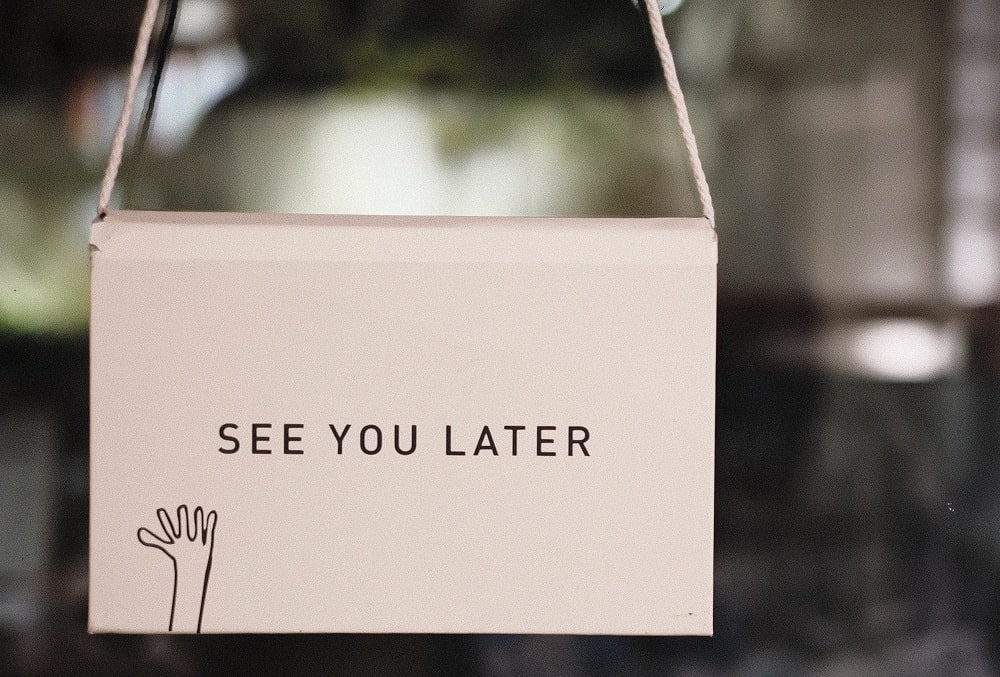
When you’re in a more casual situation, there are a whole other set of phrases and expressions you can use to say goodbye. You can use these with friends, coworkers you see often, family members and other acquaintances.
| English | Context | Example |
|---|---|---|
| See you later/See you soon | These phrases are commonly and widely used to say goodbye in more casual situations. | I'm going out for lunch. See you later! |
| See you around | You can say this to someone you sometimes run into but don't intend to make plans with, like a neighbor. | It was nice running into you. See you around! |
| See ya | This is a shortened, more casual version of either of the previous two phrases. | This is my stop. See ya! |
| I’ve got to get going | You can say this when you’re ready to leave a social gathering to let people know you’re ready to say goodbye. | I’ve got to get going. I have to wake up early tomorrow morning. |
Gotta go/ Gotta run | These are shorter, more casual versions of the previous phrase and are often used when in a rush. | Wow! It's already 5p.m. Gotta go! |
| I’m heading off/I’m taking off | This is another casual way to say you’re leaving and are ready to say goodbye. | I'm heading off, I have to feed my dog. See you tomorrow! |
| Have a good one | This is a casual way to say "Have a nice day/evening/night/etc." without having to specify, so you can use it at any time of day. | I'm taking off. Have a good one! |
| Good seeing you | This is a more casual version of "It was nice seeing you." | It was so good seeing you! Let's get together again soon. |
| Good night | This can only be used late in the evening when people are going to bed soon. Here are some more ways to say good night in English. | I'm going to bed because I have an early flight tomorrow. Good night! |
| ‘Night | This is an abbreviated, more casual version of "goodnight." You might also say "nighty night" to a child. | I'll see you in the morning. 'Night! |
| Sweet dreams | Here's a cute way to say good night by wishing that someone has good dreams as they sleep. | I'm going to bed. Goodnight! Sweet dreams! |
| Drive safe | You can say this to someone who's leaving and will be driving. | You're leaving already? Drive safe! |
| Get home safe | This is like the previous phrase but can be used no matter how the person is getting home. It's typically used at night. | Get home safe! Text me when you've arrived. |
| Have a safe trip/Have a safe flight | You can say this to someone who's going on a trip or traveling home from somewhere relatively far away. | I'm so glad you came to my wedding. Have a safe trip home! |
| Safe travels | This is a shortened, more casual version of the previous phrase. | I hope you enjoy your vacation. Safe travels! |
| Bon voyage | While this is actually a French phrase, some English speakers use it to wish someone well before they go on a trip. | Enjoy your trip to France! Bon voyage! |
| Good luck | You can say this to someone who's about to do something with some risk involved, like have surgery or perform on stage. | Good luck! I'll see you when you get back from the audition. |
| Have fun | If the person you're talking to is going to do something fun, you can wish them well with this phrase. | You're leaving for the party now? Have fun! |
| Be well | This is a goodbye or sign-off that means you wish the person well. | Thanks for listening to our podcast! Be well. |
| Keep in touch | This is a way to tell someone that you want to stay in contact with them. It's generally used when you won't see them for a while but want to talk by phone or email. | I'll see you at the wedding next summer. Keep in touch! |
| Don’t be a stranger | This is another way to tell someone you want to stay in touch with them. | Don't be a stranger...come over anytime! |
| This was fun | You can use this to tell a friend or a date that you had a good time with them. | This was fun! We should do it again soon. |
| So long, my friend | This is an old-fashioned, rather dramatic way to say goodbye that people these days generally say in a joking way. | I'm heading out...this party is boring. So long, my friends. |
| Farewell | This is another old-fashioned way to say goodbye that is now mostly used in an ironic or funny way. | Farewell, friends! I'll see you in a week. |
| I bid you adieu | Adieu is a French word that means"goodbye," and this phrase is another silly one often said with false formality among friends. | It's time for me to go home. I bid you adieu. |
Slang Ways to Say Goodbye

These are some colloquial expressions that you should know to avoid confusion when speaking with native speakers. If you can use them yourself, you’ll really impress your English-speaking friends!
| English | Context | Example |
|---|---|---|
| I gotta jet/ I gotta hit the road | These are slang versions of “I’ve got to get going.” “Gotta” is an abbreviation of “got to.” | This has been fun but I gotta jet. |
| Later/Laters/Catch you later | These slang ways of saying “see you later” are common among teenagers. They’re very casual and should only be used with people you know very well. | I've gotta go to work. Later! |
| Peace/Peace out | These casual ways of saying goodbye were trendy in the 1990s. Some people still use them today, but they can also sound outdated. | I'm heading to class. Peace! |
| I'm out/I’m out of here | This is a casual way of letting people know you’re leaving, which should only be used among friends. "Out of" is often spelled and pronounced "outta." | I finally finished all my final exams for the semester. I'm outta here! |
| Take it easy | This expression is similar to "have a good one" and encourages the person to relax and enjoy their day. In a different context, it can mean “calm down.” | I'm heading out. Take it easy, guys! |
| I’m off | This is another informal way of letting people know you’re ready to say goodbye. | Anyway, I’m off. I’ve got a busy day tomorrow. |
| Catch ya on the flip side | This slang expression for "see you later" comes from when radio DJs played vinyl records and had to flip them over to the other side. It's a pretty old school phrase, but you might hear it occasionally. "Ya" is slang for "you." | I've got basketball practice. Catch ya on the flip side! |
| Hasta la vista, baby | While this phrase comes from the Spanish language, it was made popular by Arnold Schwarzenegger's character from the 1991 film "Terminator 2: Judgment Day." | I've got some business to handle. Hasta la vista, baby! |
| Smell you later | This is another slang phrase from the 90s that you probably won't hear much these days, unless you're watching TV shows or movies from that decade. | I'm gonna be late for school. Smell ya later! |
| It's been real | This is a casual phrase used to say that you had a good time and are ready to leave. | Well friends, it's been real...but it's time for me to go. |
| Sayonara | This word comes from the Japanese language and is a very informal way to say goodbye that's been around for many years. | Have a great trip! Sayonara! |
| See you later, alligator | This is a playful way to say goodbye. It's often shorted to just "later gator." The common response is "In a while, crocodile." | It's time for you to go to school. See you later, alligator! |
Ways to Say Goodbye in a Letter or Email
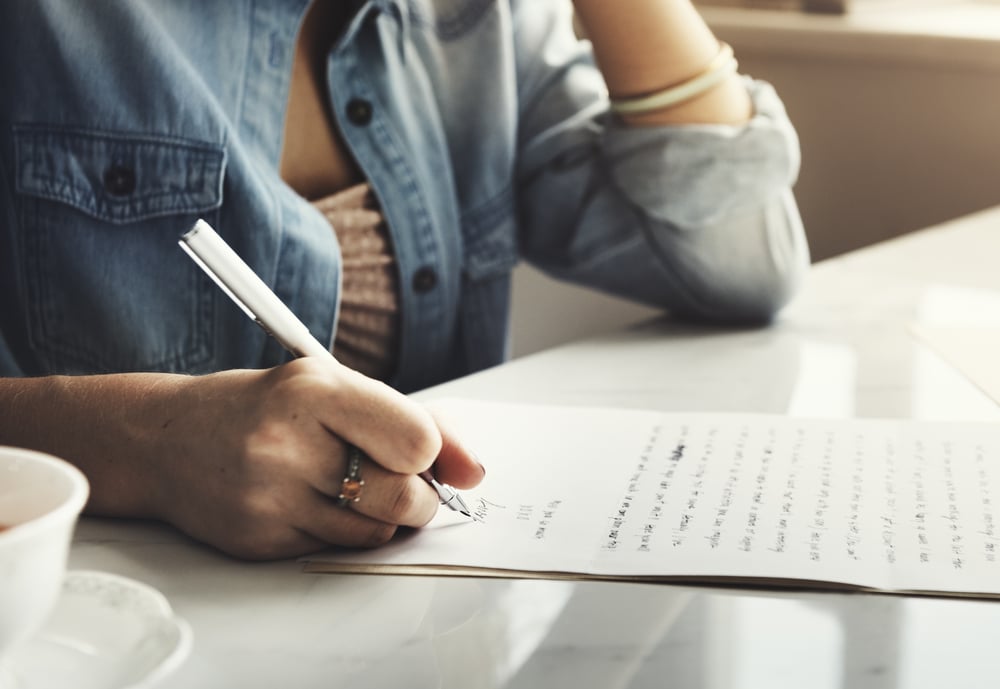
If you’re writing a letter or email, there are a different set of words and phrases often used to sign off.
| English | Context |
|---|---|
| Best regards | A versatile and professional closing suitable for business and formal correspondence. It implies well-wishing and respect. |
| Sincerely | A classic and formal way to close a letter. It's appropriate for professional and formal communications. |
| Yours truly | Similar to "sincerely," this is a traditional closing often used in formal letters. |
| Kind regards | A friendly and professional way to close a letter, suitable for both formal and informal situations. |
| Warm regards | A more personal and warm alternative to "kind regards," suitable for emails or letters where a degree of familiarity is acceptable. |
| Yours sincerely | A formal closing commonly used in business letters, especially when the recipient's name is known. |
| Take care | A friendly and casual closing, appropriate for both personal and professional emails. |
| With appreciation | Indicates gratitude and is suitable for situations where you want to express your thanks, such as after receiving a favor or assistance. |
| Until next time | Ideal for situations where you anticipate future interactions or meetings. |
| Fondly | A warm and personal closing, suitable for letters to friends or acquaintances. |
| Wishing you the best | A positive and friendly closing that works well in various contexts, conveying good wishes. |
| Best wishes | A versatile closing that can be used in both personal and professional settings, indicating goodwill. |
| In appreciation | Indicates gratitude similar to "with appreciation," suitable for expressing thanks in a formal or professional context. |
| With warmest regards | This is a kind closing you can use for friends, family members or coworkers you know well. |
| Regards | A concise and professional closing that is appropriate for business emails and formal letters. |
| All the best | A casual and friendly closing suitable for both personal and professional contexts. |
| Sending my best | Same as above. |
| Best | A shortened version of either of the two previous phrases, this is a common sign-off for emails. |
| Cheers | An informal and friendly closing, suitable for emails or letters to colleagues or friends. |
| Respectfully | A formal closing used in business or professional letters, particularly when showing respect or requesting something. |
| Cordially | A polite and formal closing suitable for business or formal correspondence. |
| With gratitude | Expresses appreciation and thanks, suitable for formal or professional communications. |
| Looking forward to our continued correspondence | Indicates anticipation of future communication, appropriate for ongoing professional relationships. |
These words and phrases are typically placed at the end of the letter or email, followed by a comma and your name below, like this:
Sincerely,
Rebecca
Ways to Say Goodbye on the Phone

Here are some ways to say goodbye when ending a phone call or when texting or chatting with a friend.
| English | Context | Example |
|---|---|---|
| Talk to you later | This is a common way to say goodbye when talking on the phone, especially if you expect to talk to them again soon. | Ok, talk to you later. Bye. |
| I'll call you right back | If your phone call gets interrupted and you need to call them back, you can use this phrase. | Sorry, my boss is calling me. I'll call you right back! |
| Call me back | If the other person gets interrupted and you want them to call you back, use this phrase instead. | Ok, that's fine. Call me back. |
| Bye for now | If you're ending the call but expect to talk again soon, you can use this phrase. | Ok, we'll talk again when you get there. Bye for now. |
| Cya/Cya l8ter | This is a shorter way to type "See you" or "See you later." Young people sometimes use it when texting or chatting. | Gotta go to class. Cya. |
| G2G | These last few abbreviations were very popular in the days of chat rooms and instant messaging platforms like AOL and MSN messenger. This one stands for "Got to go." | G2G do homework. Cya l8ter. |
| TTYL | This abbreviation stands for "Talk to you later." | G2G have dinner with my parents. TTYL. |
| BRB | This one means "Be right back" and is used when the person plans to come back to the conversation soon. | BRB, have to go to the bathroom. |
Other Resources for Saying Goodbye in English
If you can’t get enough of “goodbye” alternatives, here are some other resources that you might also find helpful.
To start, you can watch this lesson from our YouTube channel to practice and review some of the ways to say goodbye that you learned in this post:
The video below is by a well-spoken instructor who offers more ways to say goodbye.
There’s also FluentU, which lets you learn authentic English phrases like “goodbye” and how they’re used in real contexts with subtitled English videos.
FluentU takes authentic videos—like music videos, movie trailers, news and inspiring talks—and turns them into personalized language learning lessons.
You can try FluentU for free for 2 weeks. Check out the website or download the iOS app or Android app.
P.S. Click here to take advantage of our current sale! (Expires at the end of this month.)

As you can see, saying goodbye might sound simple, but there are a lot of expressions for it in English!
As you keep encountering them in different scenarios, you’ll get an instinct for when to say them naturally—a sign you’re becoming fluent.
Download: This blog post is available as a convenient and portable PDF that you can take anywhere. Click here to get a copy. (Download)
And One More Thing...
If you like learning English through movies and online media, you should also check out FluentU. FluentU lets you learn English from popular talk shows, catchy music videos and funny commercials, as you can see here:
The FluentU app and website makes it really easy to watch English videos. There are captions that are interactive. That means you can tap on any word to see an image, definition, and useful examples.
For example, when you tap on the word "searching," you see this:
Learn all the vocabulary in any video with quizzes. Swipe left or right to see more examples for the word you’re learning.

FluentU helps you learn fast with useful questions and multiple examples. Learn more.
The best part? FluentU remembers the vocabulary that you’re learning. It gives you extra practice with difficult words—and reminds you when it’s time to review what you’ve learned. You have a truly personalized experience.
Start using the FluentU website on your computer or tablet or, better yet, download the FluentU app from the iTunes or Google Play store. Click here to take advantage of our current sale! (Expires at the end of this month.)



